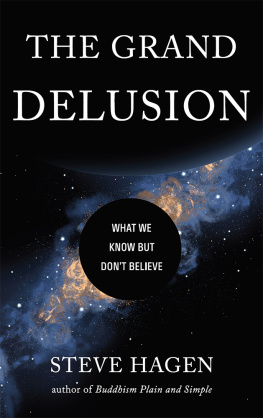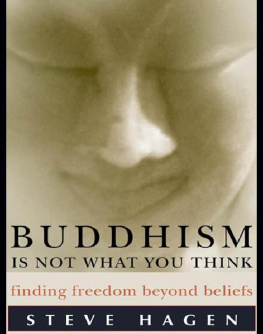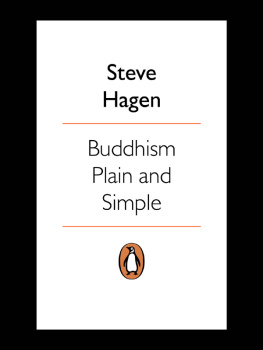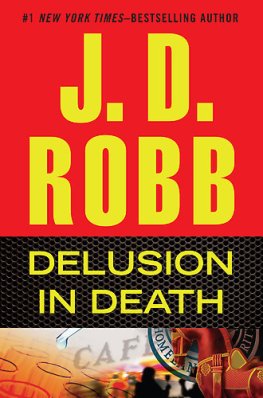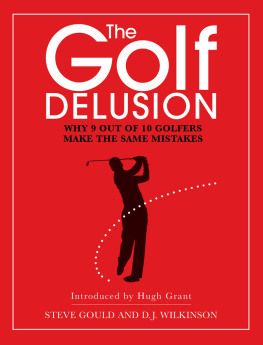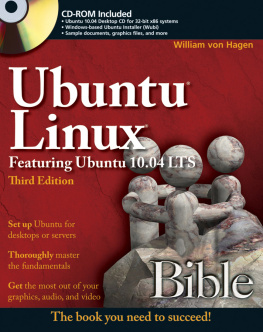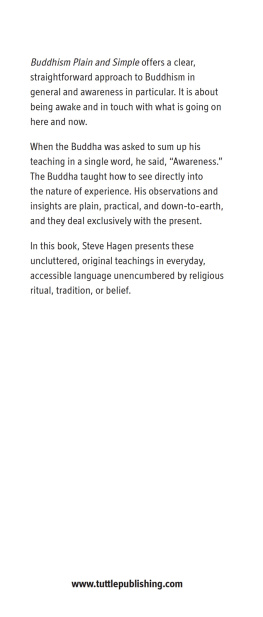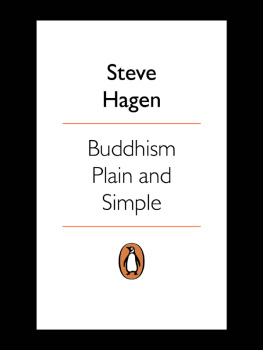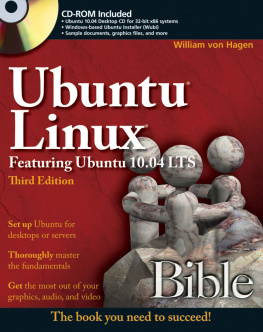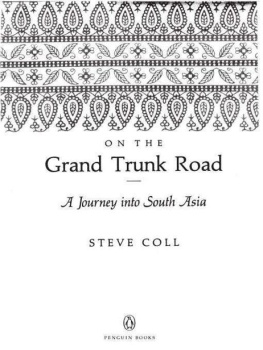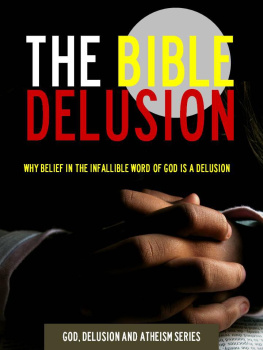Steve Hagen - The Grand Delusion
Here you can read online Steve Hagen - The Grand Delusion full text of the book (entire story) in english for free. Download pdf and epub, get meaning, cover and reviews about this ebook. publisher: Wisdom Publications, genre: Religion. Description of the work, (preface) as well as reviews are available. Best literature library LitArk.com created for fans of good reading and offers a wide selection of genres:
Romance novel
Science fiction
Adventure
Detective
Science
History
Home and family
Prose
Art
Politics
Computer
Non-fiction
Religion
Business
Children
Humor
Choose a favorite category and find really read worthwhile books. Enjoy immersion in the world of imagination, feel the emotions of the characters or learn something new for yourself, make an fascinating discovery.
- Book:The Grand Delusion
- Author:
- Publisher:Wisdom Publications
- Genre:
- Rating:4 / 5
- Favourites:Add to favourites
- Your mark:
- 80
- 1
- 2
- 3
- 4
- 5
The Grand Delusion: summary, description and annotation
We offer to read an annotation, description, summary or preface (depends on what the author of the book "The Grand Delusion" wrote himself). If you haven't found the necessary information about the book — write in the comments, we will try to find it.
The Grand Delusion — read online for free the complete book (whole text) full work
Below is the text of the book, divided by pages. System saving the place of the last page read, allows you to conveniently read the book "The Grand Delusion" online for free, without having to search again every time where you left off. Put a bookmark, and you can go to the page where you finished reading at any time.
Font size:
Interval:
Bookmark:

Wisdom Publications
199 Elm Street
Somerville, MA 02144 USA
wisdomexperience.org
2020 Steve Hagen
All rights reserved.
No part of this book may be reproduced in any form or by any means, electronic or mechanical, including photography, recording, or by any information storage and retrieval system or technologies now known or later developed, without permission in writing from the publisher.
Library of Congress Cataloging-in-Publication Data
Names: Hagen, Steve, 1945 author.
Title: The grand delusion: what we know but dont believe / Steve Hagen.
Description: Somerville, MA, USA: Wisdom Publications, 2020. | Includes index.
Identifiers: LCCN 2019055445 (print) | LCCN 2019055446 (ebook) | ISBN 9781614296782 (paperback) | ISBN 9781614296799 (ebook)
Subjects: LCSH: Knowledge, Theory of. | Belief and doubt.
Classification: LCC BD161 .H135 2020 (print) | LCC BD161 (ebook) | DDC 121 dc23
LC record available at https://lccn.loc.gov/2019055445
LC ebook record available at https://lccn.loc.gov/2019055446
ISBN 978-1-61429-678-2 ebook ISBN 978-1-61429-679-9
24 23 22 21 20
5 4 3 2 1
Cover design by David Henry Lantz. Interior design by Tony Lulek.
In remembrance of Jean
First,
Mountains are mountains and rivers are rivers.
This is delusion.
Next,
Mountains are not mountains and rivers are not rivers.
This is necessary, but still delusion.
Then,
Mountains are mountains and rivers are rivers.
My sincere thanks to Cal Appleby, Robert Evans, Ryan Johnson, Steve Matuszak, Vincent E. Parr, PhD, Linda Stevenson, and Mary Sullivan, whose careful readings of the manuscript yielded improvements and corrections.
Thanks also to Elizabeth Anderson, Richard DeWald, Jean Forester, Maurice E. Hagen, Wayne Lewis, Anne Morrow, Norm Randolph, Peter Wilson, and Susan Zeman. Each contributed in their own way through research they did on my behalf, in stimulating conversations, or, like ANYONE, by peppering me with intriguing questions.
My profound thanks to Jose Palmieri, who has assisted me in countless ways over these past twenty-plus years, and who created all the graphics that appear in this book (as well as the website that accompanies it). Jose also asked intriguing questions and shared many stimulating conversations with me.
My special thanks to Scott Edelstein, my literary agent, editor, and friend of many years, with whom I have also had countless stimulating conversations, many of which also made their way into this book. Without Scotts efforts and know-how, none of my writings would likely have made their way out into the world.
Why is there Something rather than Nothing?
Humans have grappled with some version of this existential question for millennia yet today we seem to be no closer to answering them than were our forebears of hundreds of generations ago.
Does God exist?
What does it mean to exist?
What is mind?
What constitutes measurement? This is a big problem for physicists.
We could just move on from these questions but what exactly is motion?
All of these fundamental questions and many, many more stem from a single error, a single unwarranted belief, a single Grand Delusion. Clarifying this Grand Delusion is the aim of this book.
Most of what follows is a dialogue between me and ANYONE: a nave but earnestly questioning character who could be, well, anyone a person of any gender, any age, who may be anywhere on spectrums of learned and benighted, pious and profane, serious and silly.
When what I point out causes you to want to cut in with an objection, it is my hope that ANYONE will speak for you.
Be patient, though. I wont always get to your question or objection when it first arises. But Ill likely circle back to it later on.
Time Out!
Every now and then, the main text of this book will be interrupted and augmented by Time Outs such as this one, set in this fashion. These contain additional background or contextualizing information that directly relates to what is being discussed. I recommend not skipping over them.
Endnotes and several appendices provide additional important information that further expands upon what appears in the main text. These are not mere references and citations. Much of the depth of this book will be found here.to you, but because some terms will be used in non-standard ways.
One other thing: at times, I will repeat a key theme yet every time a theme is repeated, we will go a little deeper and look at ever more subtle aspects of a topic. I invite you to greet each iteration as though meeting it for the first time.
Although ANYONE repeatedly fails to acknowledge it, there are two truths. References to conventional or everyday truth relative truths related to concepts, ideas, and objects appear in lowercase. References to Absolute Truth are capitalized. This allows a critical distinction which will become evident over the course of the text to be made without further qualification. Much of our confusion stems from the fact that our everyday conceptual terms cannot refer to Ultimate Truth or Reality, but only to conventional, relative truths. More on this later.
References to Awareness of Truth and Reality, such as knowing or seeing , are indicated in my remarks (but not in ANYONEs) through the use of italics . Conventional uses of these terms without italics refer to the knowing or seeing of thoughts, feelings, ideas, or objects in the conventional sense in which those words are generally used. This, too, will become both clear and familiar as you move through the book.
Bold text will be used for simple emphasis. Bold italics will be used for technical terms.
Questioner: Should we not seek for anything at all?
Huang-Po: By conceding this, youd save yourself a lot of mental effort.
Questioner: But there cant just be nothing.
Huang-Po: Who spoke of nothing? You wanted to seek for something.
Huang-Po: This is It; as soon as you stir your mind, you miss It.
What is the ultimate question?
For Bertrand Russell, the ultimate question was Why is there something rather than nothing?
When I first came upon that question as a young man, I immediately felt that nothing could be more profound than knowing the answer to it.
I quickly surmised, however, that there was no easy way to find out. How could we possibly know? Asking this question is like throwing it into a boundless void. How could we expect such a question to bounce back with an answer? It was as if, once launched, the question only ranged ever outward, propelled by its own inertia, never to return.
It was at once both unanswerable and utterly compelling. And for quite some time it haunted my thoughts like a spectre.
I listened to a lot of contemplative music in those days of my youth, and spent long hours brooding alone in the dark. I sometimes would listen to The Unanswered Question when I was in this mood. This piece of music provided the ideal ambiance for serious contemplation of such a deep, all-pervading mystery.
Ives seemed to capture our ultimate predicament in his offbeat score. The piece opens with distant strings playing offstage in hushed, almost imperceptible harmonies. These slowly shift through expansive chords, evoking the timeless silence and immensity of space, the indifferent universe rolling on without end.
Font size:
Interval:
Bookmark:
Similar books «The Grand Delusion»
Look at similar books to The Grand Delusion. We have selected literature similar in name and meaning in the hope of providing readers with more options to find new, interesting, not yet read works.
Discussion, reviews of the book The Grand Delusion and just readers' own opinions. Leave your comments, write what you think about the work, its meaning or the main characters. Specify what exactly you liked and what you didn't like, and why you think so.

